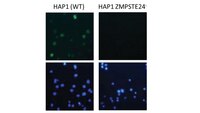MABT1577-25UG Sigma-AldrichAnti-Mature Lamin A Antibody, clone 3E12
Anti-Mature Lamin A, clone 3E12, Cat. No. MABT1577, is a mouse monoclonal antibody that detects mature Lamin A and is tested for use in Immunocytochemistry, Immunoprecipitation, and Western Blotting.
More>> Anti-Mature Lamin A, clone 3E12, Cat. No. MABT1577, is a mouse monoclonal antibody that detects mature Lamin A and is tested for use in Immunocytochemistry, Immunoprecipitation, and Western Blotting. Less<<Prodotti consigliati
Panoramica
| Replacement Information |
|---|
| References |
|---|
| Product Information | |
|---|---|
| Format | Purified |
| Presentation | Purified mouse monoclonal antibody IgG1 in buffer containing 0.1 M Tris-Glycine (pH 7.4), 150 mM NaCl with 0.05% sodium azide. |
| Quality Level | MQ200 |
| Physicochemical Information |
|---|
| Dimensions |
|---|
| Materials Information |
|---|
| Toxicological Information |
|---|
| Safety Information according to GHS |
|---|
| Safety Information |
|---|
| Storage and Shipping Information | |
|---|---|
| Storage Conditions | Recommended storage: +2°C to +8°C. |
| Packaging Information | |
|---|---|
| Material Size | 25 μg |
| Transport Information |
|---|
| Supplemental Information |
|---|
| Specifications |
|---|
| Global Trade Item Number | |
|---|---|
| Numero di catalogo | GTIN |
| MABT1577-25UG | 04065268042021 |
Documentation
Anti-Mature Lamin A Antibody, clone 3E12 MSDS
| Titolo |
|---|
Anti-Mature Lamin A Antibody, clone 3E12 Certificati d'Analisi
| Titolo | Numero di lotto |
|---|---|
| Anti-Mature Lamin A, clone 3E12 - Q3858889 | Q3858889 |













